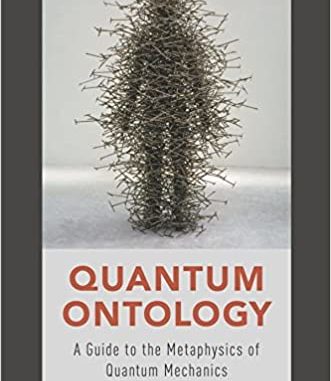
In the preface of the Introduction to Quantum Mechanics , 2nd edition, David J. Griffiths writes:
The purpose of this book is to teach you how to do quantum mechanics. Apart from some essential background in Chapter 1, the deeper quasi-philosophical questions are saved for the end. (page vii)
According to Insight: A Study of Human Understanding by Bernard Lonergan, the human mind is structured like the scientific method. The lowest level is observing and requires paying attention. Being intelligent animals, we ask questions about what we observe. We want to know the cause of things, the relationship between things, and the unity between things. At this level, we invent theories to answer the questions. At the level of reflective judgment, we marshal evidence and decide whether a theory is true or just probable. This level requires being rational. The fourth level is deciding what to do with our bodies, which requires being responsible.
There are three methods of inquiry that are relevant to understanding quantum mechanics: science, metaphysics, and philosophy. Science answers questions about observations made by our sense of hearing, seeing, and touching. For example: Why is the sky blue? Metaphysics answers questions we ask because we can make ourselves the subject of our own knowledge. For example: What is the conscious knowledge of humans as opposed to the sense knowledge of animals? The previous paragraph is an answer to the metaphysical question: What does the human mind do? Philosophy is a method of inquiry above another method of inquiry. For example: How should we do science? The theory judged to be true by rational people is the scientific method.
Many people don't distinguish between philosophy and metaphysics because they don't realize that scientific questions stand alongside metaphysical questions as equals. In my opinion, "doing quantum mechanics" means asking questions and answering them with a theory. For example: Why is the half-life of cobalt-60 5.27 years? Why is the radius of hydrogen atoms in the ground state 5.29 x 10−11 meters? The theory that answers these questions is the Schrödinger equation, and the evidence is that many measurements / observations can be calculated with this equation. In my opinion, the various interpretations of quantum mechanics are answers to what Griffiths calls "quasi-philosophical questions." These interpretations are examples of philosophy because they transcend quantum mechanics. They are answers to questions about quantum mechanics as opposed to questions about sense observations.
The author begins by reviewing classical mechanics, and says:
Quantum mechanics approaches the same problem quite differently. In this case what we're looking for is the particle's wave function, Ψ (x, t), and we get it by solving the Schrödinger equation: (page 1)
In my opinion, the use of the word wave to modify function is an attempt to interpret or explain quantum mechanics. We ask the question: What is Ψ (x, t)? The obvious theory is that it is similar to the waves we know about from classical mechanics. There is a lot of evidence Ψ (x, t) is like a mechanical wave and physicists judge this theory to be true. The theory, interpretation, or philosophical insight that Ψ (x, t) is a wave helps us understand quantum mechanics.
The author continues,
But what exactly is this "wave function," and what does it do for you once you've got it … The answer is provided by Born's statistical interpretation of the wave function which says that | Ψ (x, t) | 2 gives the probability of finding the particle at point x , at time t … The statistical interpretation introduces a kind of indeterminacy into quantum mechanics … This indeterminacy has been profoundly disturbing to physicists and philosophers alike, and it is natural to wonder Whether it is a fact of nature, or a defect in the theory. (page 2)
In my opinion, the statistics, probability, and indeterminacy related to random macroscopic events are so much different from the observations in quantum mechanics that the Born theory or interpretation does not increase our understanding of quantum mechanics. I don't think there is enough evidence supporting the Born interpretation to judge it to be true.
The observation with a possible analogy to statistics is the half-life of unstable elements. If you observe a single cobalt-60 atom for any length of time, it may or may not decay. If we start with a large number of cobalt-60 atoms, we know how many will be there after any length of time. Evidence of the truth of quantum mechanics is that the half-life of unstable elements can be calculated using the Schrödinger equation.
When you flip a coin the probability of getting heads (H) or tails (T) is ½. More precisely, flipping and observing gives you a set of results {H, T, H, H, T, H, T, T, T …}. If the probability is ½, the number of heads divided by the number of tosses approaches ½ in the limit as the number of tosses increases. There is another proviso. The ½ limit has to be true for all possible subsets. This is necessary to exclude the possibility that there is a hidden variable or demon that is affecting the results.
Flipping a coin, however, is an entirely different phenomenon than the decay of an atom. Flipping a coin involves two events: the tossing and the landing of the coin. The decay of an atom is only one event. Also, we understand what causes a coin to come up heads or tails. We do not understand what causes an atom to decay at the particular time it does decay. It is not an observation that the probability of a cobalt-60 atom decaying within 5.27 years is ½ because probability is a concept in statistics. It is only a bright idea. In my opinion, this bright idea or theory only obscures our lack of understanding of quantum mechanical phenomena. It obscures the fact that we don't know what causes an atom to decay at the particular time it does decay.
Having accepted without question Born's interpretation, Griffiths continues with his comparison of the quantum and classical mechanical treatment of the motion of a particle:
Suppose I do measure the position of the particle, and I find it to be at point C. Question : Where was the particle just before I made the measurement? (page 3)
This is a question about the statistical interpretation. If there is no evidence supporting this theory or interpretation, why ask questions about it? Griffith nevertheless goes on to spell out three theories that answer this question: realist, orthodox, and agnostic. He calls the theories positions , I suppose, because there are people who judge the theories to be true.
The realist position, according to Griffith, is that quantum mechanics is not complete. It is certainly true that quantum mechanics is not complete because there is no explanation of why a particular radioactive atom decays at the time it does. However, Griffiths is not talking about radioactive decay. Griffiths is saying the realist theory is an answer to the question about the Born interpretation. The realist theory does not answer a question about an observation in quantum mechanics.
Judging from his question about the location of a particle, if Griffith were to analyze the decay of a particular cobalt-60 atom, he would ask: what happened inside the cobalt-60 atom just before it decayed to nickel-60. In my opinion, a better question is: What caused the cobalt-60 atom to decay at the time it did. I think this is a better question because it is more general.
The question of what causes a radioactive atom to decay at the particular time it does decay raises a metaphysical question: What is causality? In physics, a causal system is one where the energy is constant. In human action, a final cause is the goal of some decision. When we spend 20 minutes washing our car, the final cause is having a clean car. In metaphysics, cause and effect occur simultaneously. The cause precedes the effect in the order of causality, not in the order of time. If the cause came before the effect in the order of time, there would be a length of time when the cause was not causing anything and the effect was not being caused by anything.
Griffiths has a different idea about causality. In his discussion of the EPR paradox, entanglement, the instantaneous collapse of wave functions, nonlocal phenomena, and superluminal influences he says:
Well, let's consider Bell's experiment. Does the measurement of the electron influence the outcome of the positron measurement? Assuredly it does -otherwise we cannot account for the correlation of data. But does the measurement of the electron cause a particular outcome for the positron? Not in any ordinary sense of the word. (page 428
What is the ordinary sense of the word? My understanding of causality is that it can't be defined. We can comprehend causality because we want to know the cause of things we observe. We have a drive to know and understand everything.
I think Griffiths's concept of causality is based on the idea that a cause precedes the effect in the order of time. He is thinking of the motion of large objects acted upon by a force that is not dependent on time. The idea is that the position of the object at one point in time causes its position at a later point in time. This non-metaphysical causality can't explain nonlocal effects because something would have to travel at speeds greater than the speed of light. Not to worry, Griffiths has another theory:
We are led, then, to distinguish two types of influence: the "causal" variety, which produce actual changes in some physical property … and an "ethereal" kind, which do not transmit energy or information, and for which the only evidence is a correlation in the data taken on the two separate subsystems … (page 428)
Just because we ask a question does not mean there has to be an answer supported by evidence. The theory that there is an "ethereal" explanation for entanglement is just a bright idea. There is no evidence for it. We have to reckon with the possibility that the universe is not intelligible.
Proudly WWW.PONIREVO.COM
Source by David Roemer



